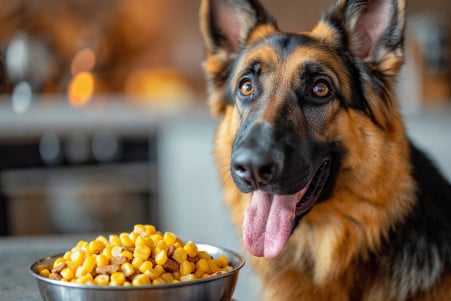Can Dogs Eat Cornstarch? Healthy Carb Sources for Pups
20 May 2024 • Updated 20 May 2024

Have you ever found yourself needing to give your dog a quick source of carbs and wondered if you could use cornstarch? Cornstarch is safe for dogs to eat in small amounts and can be used to give them a quick source of energy before a workout or to help older dogs who need to gain weight. That said, cornstarch can lead to an upset stomach if it's consumed in large quantities, so it's important to make sure you're giving your dog the right amount.
Cornstarch is a source of empty calories, and it doesn't contain the vitamins and minerals that your dog needs to be healthy. In this article, we'll look at the most recent research from veterinarians and recommendations from pet nutrition experts to help you determine if you should give your dog cornstarch and suggest other sources of carbs that are better for your dog's health.
Can dogs eat cornstarch?
Cornstarch and the Digestive System: Risks and Precautions
Consuming large amounts of cornstarch can cause digestive upset, including diarrhea, vomiting, and gas in dogs, according to Dr. Rea's research on Rogue Pet Science. Dogs that have sensitive stomachs or conditions like pancreatitis may be especially susceptible to the negative effects of consuming too much cornstarch.
Cornstarch is a source of carbohydrates and fiber, which research has shown can cause digestive upset if not gradually introduced or fed in moderation. Dogs that have pancreatitis should avoid high-fat, high-sugar, and high-starch foods, including large amounts of cornstarch, to avoid causing more inflammation and stress on the pancreas, according to Furtropolis.
Elmo's Kitchen notes that when it comes to feeding dogs that are recovering from pancreatitis, the goal is to feed a very low-fat diet with moderate protein and starchy carbs like rice - but high fiber foods should be avoided. While monitoring a dog's tolerance of cornstarch and introducing it slowly can help prevent digestive upset, some dogs may be better off avoiding it altogether.
How to Add Cornstarch to Your Dog's Diet: Tips and Precautions
Cornstarch is a safe and cost-effective carbohydrate and energy source for dogs in moderation, says Spoiled Hounds. It's often used in commercial dog food and treats as a source of fiber and as a thickening agent.
Still, veterinarians caution that cornstarch should only be a small part of a dog's diet and not a main source of nutrition, according to PetMD. While it can be a gluten-free dog treat, it should not be the main source of nutrition for dogs or replace important nutrients and proteins.
It's always a good idea to talk to a vet before adding new foods like cornstarch to your dog's diet, especially if your dog has any health issues or dietary restrictions, says Spoiled Hounds. This will help you make sure you're giving your dog the right amount and that it's part of a well-balanced diet.
How to Tell If Your Dog Is Allergic or Intolerant to Cornstarch
Although cornstarch is less likely to cause an allergic reaction than other corn-based ingredients, dogs can still be allergic to it. Signs of a food allergy or intolerance in dogs include skin irritation, ear infections, gastrointestinal symptoms such as diarrhea and vomiting, and respiratory issues, notes PetMD.
If you suspect your dog is allergic or intolerant to cornstarch, your vet may recommend an elimination diet, which involves removing cornstarch and other potential allergens from the dog's diet for a period of time and then reintroducing them one at a time to see if the dog has a reaction, according to VetInfo. Allergy tests, including blood and skin tests, can also be used to determine if a dog is allergic to specific foods, including cornstarch.
If your dog is found to be allergic or intolerant to cornstarch, it's important to eliminate cornstarch and other corn-based ingredients from their diet. This is something to keep in mind when looking at the impact of cornstarch on dogs with food sensitivities and chronic health issues.
Cornstarch and Sensitive Digestive Systems: Special Considerations for Dogs with Chronic Conditions
Dogs with chronic digestive issues such as inflammatory bowel disease (IBD) or sensitive stomachs may require cornstarch to be avoided or limited in their diets since it is a complex carbohydrate that can be hard for some dogs to digest, which could make their condition worse. Earthborn Holistic Pet Food notes that dogs with bloat or gastric dilatation-volvulus (GDV) may also need to avoid cornstarch and other high-carb ingredients.
Veterinary-prescribed diets for dogs with chronic digestive issues often restrict or eliminate ingredients such as cornstarch to help the digestive system work less, according to Elmo's Kitchen. It's important to work with a vet and carefully observe a dog's symptoms when it comes to cornstarch to help manage these chronic issues and make sure they're getting a diet that's appropriate and easy to digest.
Conclusion: Weighing the Benefits and Drawbacks of Cornstarch for Dogs
Cornstarch can be a healthy and helpful addition to a dog’s diet as long as it is part of a well-rounded meal plan and fed in moderation. It can offer a source of carbohydrates and energy, and it may be a good choice for dogs with corn allergies because it is less likely to cause an allergic reaction.
That said, consuming too much cornstarch can cause digestive problems, especially for dogs that have sensitive stomachs or pre-existing conditions such as pancreatitis. If your dog has special dietary needs or health issues, it’s important to work with your vet to make sure their diet is being managed and adjusted properly.
Like any new food, it’s important to introduce cornstarch slowly and watch your dog for any signs of intolerance or adverse reactions.


